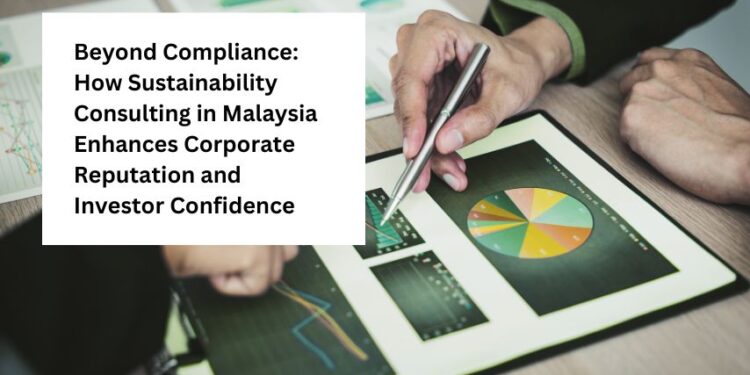Sustainability isn’t just a buzzword in today’s corporate world—it’s a critical element shaping the future of business and investment. For companies operating in Malaysia, sustainability consulting offers a pathway to move beyond merely meeting regulatory requirements. It helps brands build credibility, foster investor confidence, and make meaningful contributions to environmental and community well-being. Here, we explore how sustainability consulting in Malaysia is driving corporate success while addressing some of the most pressing global challenges.
The Evolving Role of Sustainability in Malaysian Businesses
From Compliance to Strategic Advantage
Traditionally, businesses approached sustainability as a compliance requirement to adhere to environmental regulations, such as Malaysia’s Environmental Quality Act 1974. However, the global pivot towards greener economies and the rising awareness among consumers and investors have positioned sustainability as a strategic business imperative.
Enter sustainability consulting—a growing field providing businesses with the expertise to not only meet compliance benchmarks but also thrive in a competitive and increasingly eco-conscious marketplace. By adopting sustainability strategies tailored to their operations, Malaysian companies are leveraging this movement to build stronger reputations and attract diversified investment opportunities.
The Malaysian Sustainability Context
Malaysia is richly endowed with natural resources, which play a vital role in its economy. However, rapid industrialization and urban growth have posed challenges in balancing economic development with environmental sustainability. Initiatives such as Malaysia’s Five-Year Plan and adherence to the United Nations Sustainable Development Goals (SDGs) illustrate the government’s commitment to sustainable progress.
This commitment extends to corporate Malaysia. Publicly listed companies on Bursa Malaysia are now required to disclose their sustainability efforts in annual reports, signaling an overarching shift toward accountability and transparency. This has increased demand for sustainability consulting firms that can guide businesses through the complexities of integrating environmental, social, and governance (ESG) principles.
How Sustainability Consulting Strengthens Corporate Reputation
A company’s reputation is one of its most valuable assets. Integrating robust sustainability practices enhances stakeholder trust, reinforces brand loyalty, and differentiates companies in crowded industries.
Building Public Trust Through Transparency
Trusted sustainability consultants like Wellkinetics help organizations craft comprehensive ESG reports, often a requirement for investors and regulatory agencies. Detailed reporting showcases a company’s dedication to integrity, transparency, and ethical practices. For example, multinational companies operating in Malaysia, such as Nestlé Malaysia, regularly publish their sustainability reports detailing initiatives like reducing palm oil usage and improving supply chain sustainability. These efforts not only resonate with consumers but also strengthen corporate credibility.
Differentiating Brands in the Market
A well-executed sustainability strategy allows businesses to stand out. For instance, Sime Darby Plantation, a Malaysia-based agribusiness corporation, has earned accolades for its sustainable palm oil initiatives. By embedding sustainability into the company’s DNA, they’ve managed to differentiate themselves globally in a commodity market often criticized for its environmental impact.
Sustainability consultants play a critical role in this transformation by helping businesses identify areas for improvement, set measurable goals, and implement impactful changes that leave a lasting mark on their industry.
Crisis Management and Risk Mitigation
Companies that proactively address sustainability issues fare better when environmental or social crises arise. Sustainability consultants equip Malaysian firms with strategies to manage risks such as labor disputes, supply chain disruptions, or regulatory non-compliance. By anticipating challenges, these companies can maintain stakeholder trust even during turbulent periods.
Also read: Champion Environmental Goals with Sustainability Software Companies
The Connection Between Sustainability and Investor Confidence
Investors today are acutely aware of the impact ESG factors have on long-term business performance. Gone are the days when environmental or social considerations were viewed as secondary. Now, they sit firmly in the spotlight, influencing investment decisions and shareholder priorities.
Sustainability as a Marker of Resilience
Investors see companies with strong sustainability practices as better long-term bets. They connect sustainability with risk management, operational efficiency, and the ability to adapt in a changing business ecosystem. For example, Telekom Malaysia has embraced a “Green Office” agenda, implementing energy-saving practices and reducing paper consumption. These efforts showcase their focus on operational efficiency, innovation, and resilience—qualities that attract ESG-conscious investors.
Sustainable Investments on the Rise
Malaysia has witnessed a rise in green financing initiatives, such as the issuance of Green and Sustainable Sukuk (Islamic bonds). These financial instruments not only align with Malaysia’s Islamic finance framework but also signal a commitment to sustainability. Companies that align with these values are better positioned to attract investment in this growing market. Sustainability consultants often assist businesses in meeting the criteria necessary for participating in such initiatives.
Real-Life Success Stories
Corporations including Petronas, Malaysia’s state-owned oil and gas company, have successfully bolstered investor confidence by embedding sustainability into their strategy. Their “Net Zero Carbon by 2050” roadmap demonstrates a forward-thinking approach that resonates with institutional investors globally.
The Broader Implications for Businesses and the Environment
Sustainability consulting doesn’t just benefit individual businesses or their investors—it has rippling effects that contribute to broader societal and environmental goals.
Pioneering Climate Action
Malaysia’s manufacturing and agriculture sectors have historically contributed to carbon emissions and resource depletion. Sustainability consulting firms help businesses in these sectors chart a pathway to reducing carbon footprints through technologies like renewable energy, energy efficiency, and circular economy practices. By doing so, corporations contribute to Malaysia’s goal of becoming a low-carbon nation by 2040 under the Low Carbon Mobility Blueprint.
Social Impact in Communities
Beyond environmental considerations, sustainability efforts also focus on corporate social responsibility (CSR). Leading Malaysian organizations are implementing social programs that support local communities. For example, companies like Sunway Group have focused on inclusive education and community engagement as part of their CSR programs, signaling a commitment to uplifting society.
Sustainability consultants play an instrumental role in designing CSR initiatives that create tangible benefits, enhance social wellbeing, and strengthen the company’s relationship with its community stakeholders.
Driving Innovation and Competitiveness
Sustainability challenges often spark innovation. Companies in the Malaysian manufacturing sector, for instance, are exploring the use of biomass as an alternative energy source. Not only does this lower carbon emissions, but it also creates new revenue streams.
Consultants facilitate these transitions by conducting feasibility assessments, modeling potential outcomes, and helping businesses stay ahead of industry trends.
Overcoming Challenges Faced by Malaysian Firms
The transition to sustainability isn’t without its challenges. High implementation costs, lack of internal expertise, and resistance to change are common hurdles for Malaysian businesses. This is where sustainability consultants like Wellkinetics offer invaluable support, acting as strategic partners that guide companies through:
- Cost-Benefit Analyses: Highlighting long-term cost savings and ROI from sustainable practices.
- Employee Training: Building internal capabilities to ensure sustained progress.
- Stakeholder Engagement: Facilitating dialogue with investors, regulators, and communities to align expectations and build support.
By addressing these challenges holistically, consultants empower businesses to achieve meaningful and enduring transformations.
Closing Thoughts
Sustainability consulting is altering how businesses operate in Malaysia. It shifts the focus from a “do no harm” mindset to a proactive approach that drives tangible value for stakeholders. Companies that invest in these services not only enhance their reputation but also instill confidence among investors looking for responsible, future-ready organizations.
For Malaysian businesses, adopting sustainability isn’t just about compliance—it’s about showing leadership in matters that will shape the economic, social, and environmental landscape of the nation. With the right strategies and deft guidance from an expert sustainability consultant, organizations have an unprecedented opportunity to build a legacy of innovation, responsibility, and long-term prosperity.
Actionable Next Steps for Businesses:
- Engage a Sustainability Consultant: To assess current practices and chart a tailored path forward.
- Develop Transparent Reporting Mechanisms: Begin publishing annual ESG reports to maintain accountability and attract investors.
- Collaborate Across Industries: Share best practices and innovative solutions to accelerate sustainable transformation in Malaysia.
By taking these steps, Malaysian companies can continue to lead the way in corporate sustainability, benefiting both their bottom line and the world around them.
















